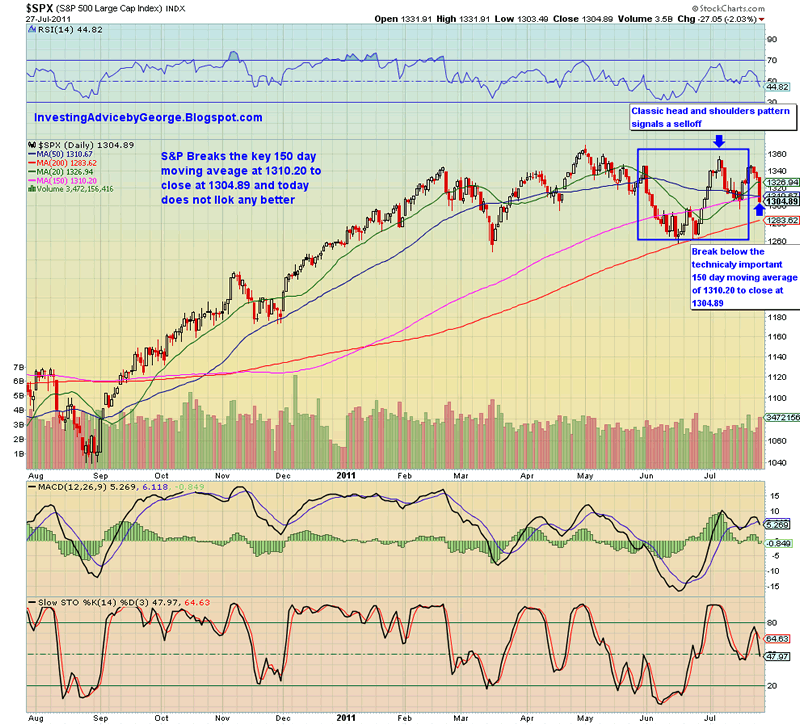US Debt Downgrade Grows Closer Than Ever
Stock-Markets / US Debt Jul 28, 2011 - 04:06 AM GMTBy: George_Maniere
 Each day that passes without a deal to prevent a U.S. debt default brings the United States closer to a financial calamity that would be more severe than the failure of Lehman Brothers in 2008.
Each day that passes without a deal to prevent a U.S. debt default brings the United States closer to a financial calamity that would be more severe than the failure of Lehman Brothers in 2008.
Dueling speeches from U.S. President Barack Obama and Speaker of the House John Boehner, R-OH, Monday night did nothing to resolve the impasse between Republicans and Democrats over how to reduce budget deficits and raise the debt ceiling past the $14.3 trillion limit by Aug. 2.
The contentious rhetoric of recent days has raised concerns that lawmakers will fail to reach a compromise by the deadline – with disastrous consequences.
“I’ve never, never seen a breakdown like this,” Paul Light, a U.S. government scholar, told Reuters. “This is a defining moment in America’s inability to act.”
Should the deadlock over avoiding a U.S. debt default endure past Tuesday’s deadline, it will trigger a financial crisis of vast proportions:
- Plummeting equities: When Lehman Brothers failed, the Dow Jones Industrial Average dropped 504 points in one day, and kept falling for months afterward. A default by the United States on its debt could hit even harder. Lance Roberts, CEO of Streettalk advisers, told The Fiscal Times that stocks could fall 50%. That would torpedo retirement accounts and hurt investors large and small.
- Missing payments: the government borrows about 40% of what it spends every day. If it can’t borrow, then it will have to cut spending by 40% immediately – more than 10% of gross domestic product (GDP). That could mean missed payments to government contractors and recipients of government assistance. It may also mean that hundreds of thousands of federal workers will be furloughed without pay. In addition to the personal pain, billions of dollars in government spending will vanish from the economy.

- Interest rates: Credit rating agency Standard & Poor’s already has warned of a 50% likelihood that it will downgrade the credit rating of the United States in the coming months – as much for its high debt levels as the possibility of default. If lawmakers allow a U.S. debt default, S&P says it will cut the country’s credit from AAA to D. That would mean higher interest rates (and higher costs) not only for U.S. debt, but for all credit. Because other types of lending – including home loans, credit card rates and student loans – are based on U.S. Treasurys, the cost of borrowing would skyrocket for consumers and businesses alike.
- States and cities: Likewise, states and municipalities would face higher borrowing costs, since their rates, too, are tied to Treasurys. That will make all capital projects – roads, water systems, hospitals, schools – more expensive.
- Credit crunch: Higher borrowing costs and financial turmoil could lead to another credit crunch like the one we saw following the Lehman Brothers collapse. And that would further strangle the U.S. economic recovery.
- Bank crisis: A less obvious problem arising from a U.S. debt default would be how it affects large banks, which use Treasurys as collateral for their own borrowing. “What happens if treasuries as collateral aren’t seen as the risk-free instruments they have been?” said Money Morning Contributing Editor Shah Gilani, who is worried about the impact of discounted Treasury holdings on the banks’ leveraged positions. “Could an ugly round of global de-leveraging undermine investor confidence again and derail hoped-for economic growth?”
- Lower dollar: Already in a years-long slump, the dollar will sink even further against the world’s other currencies. S&P has estimated a U.S. debt default could cause the dollar to drop 10% or more. A weaker dollar will make imports more costly, but that’s not the worst of it. A default or credit downgrade could cause the dollar to lose its status as the world’s reserve currency. And that would be very bad for the U.S. economy.
Combine all of the above and you can see how a U.S. debt default could implode an already shaky economy. Not only would the recession return with a vengeance, but the economy could sink even lower than it did in 2008-2009.
“It’s conceivable the worst-case scenario is that the entire financial system of the world just freezes up, and it will make what happened with Lehman Brothers look much less by comparison,”Bruce Bartlett,a former Reagan White House policy adviser, told The Fiscal Times.
By George Maniere
http://investingadvicebygeorge.blogspot.com/
In 2004, after retiring from a very successful building career, I became determined to learn all I could about the stock market. In 2009, I knew the market was seriously oversold and committed a serious amount of capital to the market. Needless to say things went quite nicely but I always remebered 2 important things. Hubris equals failure and the market can remain illogical longer than you can remain solvent. Please post all comments and questions. Please feel free to email me at maniereg@gmail.com. I will respond.
© 2011 Copyright George Maniere - All Rights Reserved
Disclaimer: The above is a matter of opinion provided for general information purposes only and is not intended as investment advice. Information and analysis above are derived from sources and utilising methods believed to be reliable, but we cannot accept responsibility for any losses you may incur as a result of this analysis. Individuals should consult with their personal financial advisors.
© 2005-2022 http://www.MarketOracle.co.uk - The Market Oracle is a FREE Daily Financial Markets Analysis & Forecasting online publication.



